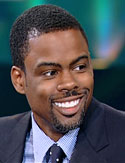The Authentics

PAGE 2
Chris Rock
There's an adage among stand-ups that says it takes 10 years to come up with a good 10-minute set. Every three or four years, Chris Rock delivers an excellent hour of fresh material—what he calls his state of the union address.
Like all great comedians, Rock is an acute observer of the human condition and a serious man. His stand-up confronts uncomfortable issues, among them race ("Every town has the same two malls: the one white people go to and the one white people used to go to") and class ("There are people who would like to get rid of minimum wage. But we have to have it, because if we didn't some people would not get paid money. They would work all week for two loaves of bread and some Spam"). He's funny, but he doesn't hesitate to serve up the provocation straight: "The government doesn't give a f*** about your safety. They sell guns at Wal-Mart; they don't give a f*** about you!" His voracious performances do triple duty, enlisting, dissecting, and amusing his targets—us—all at once.
Rock grapples with what strikes him: A hunch turns into a premise, a stranger's gesture suggests a character, the two—over months—become a bit. ("I need to get it out, and it takes me a long time to get the material to the level I feel.") Right now he's mulling over America's devaluation of intelligence. "We have no idea who's smart; we only know who's rich," he says. He's worried about the chilling effect of the "gotcha!" culture of cell phone films. He's disturbed by how our national obsession with celebrity distracts us from the war. His bits may start off quietly, but by the time they reach an audience, they're fierce.
When he writes, he cranks up Prince for inspiration. "He reinvented himself," says Rock. "Different albums, different sounds." Rock's own versatility cuts across genres, including successful scripts for TV and film. His goals are as expansive: "I am into showing black people in any way that we're not being seen." But while he gleefully eviscerates the media—the culprit behind stereotypical portrayals of black people—no one is spared his scrutiny. ("Get real! When I'm looking over my shoulder at an ATM machine, I'm not scared of the media!")
Rock feels an artist's obligation is to express, unhindered, his God-given gift. Fame is incidental. The common man's church is the comedy club. Words are powerful, and Rock labors hard to get the most from them. "You spend your whole life biting your tongue," he says. "You're married, you're biting your tongue. You go to work, you're biting your tongue. So it's nice to go someplace to see some guys and women exercise free speech. And if it's funny, even better."
There's an adage among stand-ups that says it takes 10 years to come up with a good 10-minute set. Every three or four years, Chris Rock delivers an excellent hour of fresh material—what he calls his state of the union address.
Like all great comedians, Rock is an acute observer of the human condition and a serious man. His stand-up confronts uncomfortable issues, among them race ("Every town has the same two malls: the one white people go to and the one white people used to go to") and class ("There are people who would like to get rid of minimum wage. But we have to have it, because if we didn't some people would not get paid money. They would work all week for two loaves of bread and some Spam"). He's funny, but he doesn't hesitate to serve up the provocation straight: "The government doesn't give a f*** about your safety. They sell guns at Wal-Mart; they don't give a f*** about you!" His voracious performances do triple duty, enlisting, dissecting, and amusing his targets—us—all at once.
Rock grapples with what strikes him: A hunch turns into a premise, a stranger's gesture suggests a character, the two—over months—become a bit. ("I need to get it out, and it takes me a long time to get the material to the level I feel.") Right now he's mulling over America's devaluation of intelligence. "We have no idea who's smart; we only know who's rich," he says. He's worried about the chilling effect of the "gotcha!" culture of cell phone films. He's disturbed by how our national obsession with celebrity distracts us from the war. His bits may start off quietly, but by the time they reach an audience, they're fierce.
When he writes, he cranks up Prince for inspiration. "He reinvented himself," says Rock. "Different albums, different sounds." Rock's own versatility cuts across genres, including successful scripts for TV and film. His goals are as expansive: "I am into showing black people in any way that we're not being seen." But while he gleefully eviscerates the media—the culprit behind stereotypical portrayals of black people—no one is spared his scrutiny. ("Get real! When I'm looking over my shoulder at an ATM machine, I'm not scared of the media!")
Rock feels an artist's obligation is to express, unhindered, his God-given gift. Fame is incidental. The common man's church is the comedy club. Words are powerful, and Rock labors hard to get the most from them. "You spend your whole life biting your tongue," he says. "You're married, you're biting your tongue. You go to work, you're biting your tongue. So it's nice to go someplace to see some guys and women exercise free speech. And if it's funny, even better."



